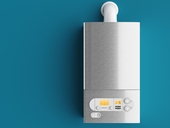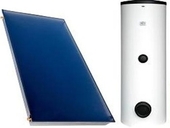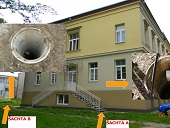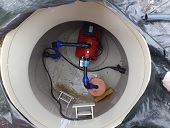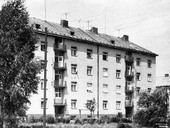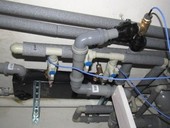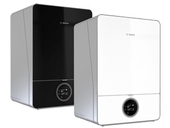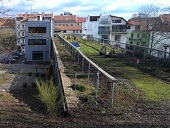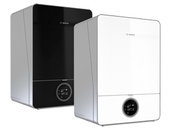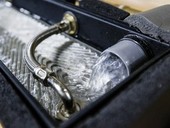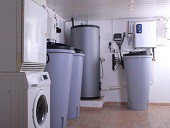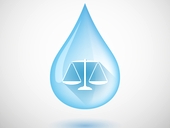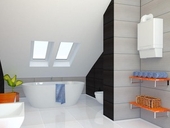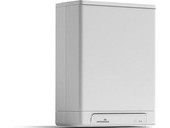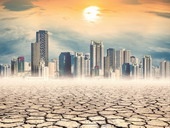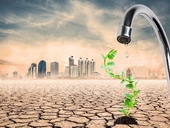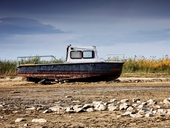The paper gives a simple method for calculating the annual production of condensate in the condensing boiler.
Archiv článků od 23.5.2016 do 2.1.2017
Rainwater is largely perceived as a waste water in Slovakia and in the Czech Republic, which should be divert as soon as possible to the sewage system. For many years it was mostly only one way of drainage of buildings and paved surfaces generally called “conventional way” of drainage. This paper describes the possibility of using rainwater in the school building, on the basis of the measured volume of rainwater runoff draining from the roof construction. The data were compared with the theoretical values of the water needs for the building.
This paper describes measured data and evaluation of water consumption in a family house, where secondary source of water was introduced - water from a well. Potable water was fully replaced by well water for the purpose of flushing toilets and laundry . This paper also describes the measurement data of stormwater runoff from the roof of the school building as a potential alternative water source for this building. Next step was the comparison of the current potable water consumption in the building with inflowed rainwater and evaluation of its potential for supplying the object in case of accumulation of this water.
The introduction of stricter Ecodesign requirements for products associated with the consumption and production of energy is related to a smooth transition to the use of gas condensing boilers. In practice, exchanges of old boilers meet incorrect interpretation and perceptions about the benefits of condensing boilers. The article therefore assesses the impact of condensation theory and measurement and answers some practical issues.
The introduction of stricter Ecodesign requirements for products associated with the consumption and production of energy is related to a smooth transition to the use of gas condensing boilers. In practice, exchanges of old boilers meet incorrect interpretation and perceptions about the benefits of condensing boilers. The article therefore assesses the impact of condensation theory and measurement and answers some practical issues.
The article deals with possibilities of using heat from waste water discharged by outlet pipes of house appliances. The first section describes the basic possibilities of the local heat recovery (recuperation), used mainly in showers and shower baths. Theoretical analysis of the efficiency and related achievable savings is supported by an experimental measurement of a selected type of recuperative heat exchanger. The results of the measurement are compared with the classification according to the Passive House Institute. In addition to the efficiency and energy savings achieved by deploying the recuperative heat exchanger, the economic return of the specific heat exchanger is also determined for different boundary conditions.
In practise we meet more and more places that are not connected to the utility network and must be dealt individually. At the same time number of technical solutions which can tackle this task as effectively as possible and take individual requirements into account is increasing. Solutions range reaches from small savings in water consumption to total replacement of drinking water, from the use of gray water for flushing to its full recyclation.
The article describes the requirements for domestic hot water in residential houses. It deals with determining the need for hot water depending on the type of house, hot water consumption profile in residential buildings and with three basic methods for designing storage hot water tank and heat output of hot water heaters.
The article compares legislative regulations in hot water preparing and their impact on the determination of hot water requirements. It is based on analysis of hot water consumption in hotels compared with hot and cold water requirements. The influence and aplication of the legislative regulation are described in relation to reducing warm water energy consumption.
The question is: is gas condensing boiler with a hot water flow requiring power of 24 kW suitable for the apartment with little heat loss? Because under these conditions for the entire heating time, or a large part, boiler will cycle. Will this cycling be negatively reflected on the natural gas bill?
The question is: is gas condensing boiler with a hot water flow requiring power of 24 kW suitable for the apartment with little heat loss? Because under these conditions for the entire heating time, or a large part, boiler will cycle. Will this cycling be negatively reflected on the natural gas bill?
Relatively common requirements for the amount of surface water has led in most European countries that did not deal with the amount of surface water, or only as usage requirements. The newly discovered but long dry periods, higher demands on water abstraction and the first forecasts of the expected climate change.
zpět na aktuální články
